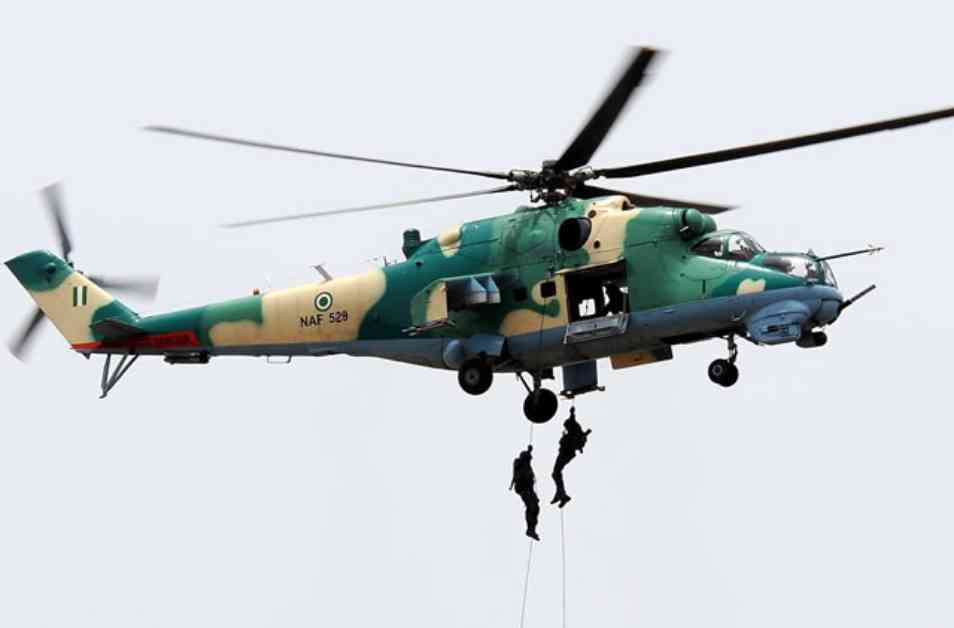The Nigerian Air Force Strikes Down Boko Haram Hideouts in Borno
In a recent development, the Nigerian Air Force carried out a precise airstrike targeting Boko Haram enclaves in Chikide and Degbewa located in Borno State. The operation was a strategic move to deal a heavy blow to the terrorist group, following credible intelligence, surveillance, and reconnaissance reports. The focus was on key insurgent hideouts within the challenging terrain of the Mandara Mountains, where the notorious terrorist leader Ali Ngulde and his fighters were believed to be congregating.
Detailing the operation, Deputy Director of Public Relations and Information, Group Captain Kabiru Ali, revealed that surveillance missions had confirmed the existence of a fortified command hub with solar-powered installations in the area. This crucial information prompted the Nigerian Air Force to launch a surprise night attack aimed at disrupting the terrorist activities and dismantling their stronghold.
Impact of the Airstrike
The precision night airstrike executed by the Nigerian Air Force on March 16, 2025, was described as a bold demonstration of air power and precision warfare capabilities. Targeting the insurgent enclaves deep within the treacherous Mandara Mountains, the operation delivered a devastating blow to the terrorists’ stronghold. Reports indicated that key logistics and command structures were destroyed, leading to large fires and the neutralization of numerous terrorists.
The successful execution of the night operation highlighted the growing dominance of the Nigerian Air Force in both day and night air power capabilities. By demonstrating the ability to conduct precision strikes under the cover of darkness, the NAF has effectively shown that insurgents can no longer operate with impunity during nighttime. The commitment to utilizing formidable air power to neutralize terrorist networks and restore lasting peace to the region was reiterated by Group Captain Kabiru Ali.
Expert Insights and Commentary
Speaking on the significance of the airstrike, military experts have lauded the Nigerian Air Force for its proactive approach in targeting Boko Haram hideouts. Retired Air Marshal James Okafor, a seasoned defense analyst, emphasized the importance of continuous surveillance and intelligence gathering in the fight against terrorism. He commended the NAF for its strategic execution of the operation, noting that such precision strikes are essential in dismantling terrorist networks and ensuring national security.
The impact of the airstrike on Boko Haram’s operational capabilities is expected to disrupt their activities significantly and weaken their command structure. By targeting key insurgent hideouts and logistical hubs, the Nigerian Air Force has dealt a severe blow to the terrorist group, limiting their ability to plan and execute attacks in the region. The successful operation serves as a testament to the NAF’s commitment to safeguarding the nation and eradicating threats posed by violent extremist groups.
As the dust settles on the recent airstrike, the focus remains on maintaining pressure on Boko Haram and other insurgent groups operating in the region. The Nigerian Air Force continues to demonstrate its prowess in conducting precision strikes and night operations to root out terrorist elements and restore peace and stability to the affected areas. By leveraging advanced intelligence capabilities and modern air power technologies, the NAF stands at the forefront of the fight against terrorism in Nigeria and beyond.
In conclusion, the recent airstrike targeting Boko Haram hideouts in Borno represents a significant milestone in the ongoing efforts to combat terrorism and secure the region. The successful operation showcases the Nigerian Air Force’s operational capabilities and commitment to safeguarding the nation from internal threats. As the fight against terrorism continues, the NAF’s proactive approach and strategic execution will play a vital role in maintaining peace and security in the region, ultimately leading to the eradication of extremist elements and the restoration of normalcy for the affected communities.












